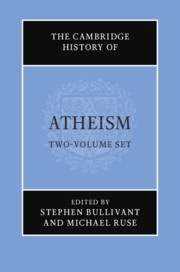Book contents
- The Cambridge History of Atheism
- The Cambridge History of Atheism
- Copyright page
- Dedication
- Contents
- Acknowledgments
- Contributors
- Introduction
- Part I Preliminaries
- Part II Atheisms in History
- Part III Reformation, Renaissance, Enlightenment
- Part IV Classical Modernity: Philosophical and Scientific Currents
- Part V Classical Modernity: Social and Political Currents
- Part VI Twentieth and Twenty-First Centuries: Intellectual and Artistic Currents
- Part VII Lived Atheism in the Twentieth- and Twenty-First Centuries: Case-Studies
- 42 Latin America
- 43 The Road to Modern China
- 44 Contemporary China
- 45 Atheism in India: Twentieth Century and Beyond
- 46 The Soviet Union
- 47 Modern Germany
- 48 The Nordic and Baltic Countries
- 49 United States
- 50 The Pacific Northwest
- 51 Tunisia
- 52 Southern Africa
- 53 Traditional Societies
- Part VIII Emerging Atheisms in the Twenty-First Century
- Part IX Conclusion
- Index
- References
45 - Atheism in India: Twentieth Century and Beyond
from Part VII - Lived Atheism in the Twentieth- and Twenty-First Centuries: Case-Studies
Published online by Cambridge University Press: 25 September 2021
- The Cambridge History of Atheism
- The Cambridge History of Atheism
- Copyright page
- Dedication
- Contents
- Acknowledgments
- Contributors
- Introduction
- Part I Preliminaries
- Part II Atheisms in History
- Part III Reformation, Renaissance, Enlightenment
- Part IV Classical Modernity: Philosophical and Scientific Currents
- Part V Classical Modernity: Social and Political Currents
- Part VI Twentieth and Twenty-First Centuries: Intellectual and Artistic Currents
- Part VII Lived Atheism in the Twentieth- and Twenty-First Centuries: Case-Studies
- 42 Latin America
- 43 The Road to Modern China
- 44 Contemporary China
- 45 Atheism in India: Twentieth Century and Beyond
- 46 The Soviet Union
- 47 Modern Germany
- 48 The Nordic and Baltic Countries
- 49 United States
- 50 The Pacific Northwest
- 51 Tunisia
- 52 Southern Africa
- 53 Traditional Societies
- Part VIII Emerging Atheisms in the Twenty-First Century
- Part IX Conclusion
- Index
- References
Summary
Recently, there have been attempts to study atheism in different disciplines, from historians to anthropologists, going beyond the conventional trajectory of studying only the west. Scholars have looked at different histories of atheism in many locations, and in that process have challenged the idea that atheism is essentially a western phenomenon. When atheism is seen as a western idea, the non-west is mostly perceived as spiritual and metaphysical. The politics involved in making certain places atheistic and certain places spiritual has to be understood, and anthropologists and historians have looked at different locations and places, and studied various forms of atheism and unbelief. This chapter is an attempt to discuss atheism in India, and to see its many meanings and many histories. In that process it challenges the monolithic reading of atheism.
- Type
- Chapter
- Information
- The Cambridge History of Atheism , pp. 831 - 849Publisher: Cambridge University PressPrint publication year: 2021
References
- 1
- Cited by



